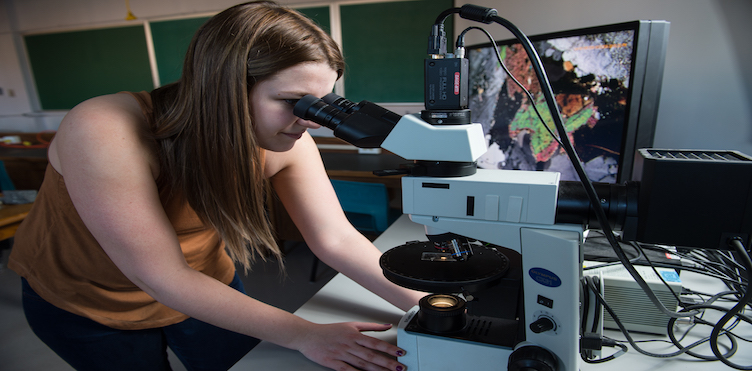Earth Sciences

- Degrees Offered: MSc & PhD
- Application Deadline: Open
- Study Options: Thesis, Dissertation
- Length: Two (MSc) and Four (PhD) Years
- Entry Terms: Fall, Winter, Summer
Our recent graduates have gone on to work mainly in the mineral exploration and petroleum sectors, geosciences, geophysics, and environmental geoscience consulting, government research in natural resources, academe. We generally have about 30-40 students that work with research-active faculty with strong links with provincial (NB-DNR) and federal (GSC) geological surveys.
One of our key features is that we offer field-based student research, which is conducted throughout Canada. Students have access to cutting edge labs and facilities; such as, the Laser Ablation inductively-coupled plasma mass spectrometry, geochemical and spectroscopic analytical facilities, geophysical equipment and software, electron and light microscopy, experimental petrology, sample preparation and thin section preparation (UNB Earth Sciences maintains one of the best thin section preparation facilities in Canada).
Our students work in a collegial environment and have a well-organized graduate student society (AGES). The Planetary and Space Science Centre (PASSC) have some graduate students that are directly studying lunar soil and Martian meteorites affected by the impact of asteroids and comets.
Research areas and current faculty
- Applied Geophysics, Hydrogeophysics and Rock Physics (Karl Butler, Kynan Hughson)
- Periglacial Geology and Surface Processess (Kynan Hughson)
- Planetary Geology (Kynan Hughson, John Spray)
- Aqueous & Environmental Geochemistry & Hydrogeology (Allison Enright)
- Igneous, Metamorphic, & Experimental Petrology (Cliff Shaw, Chris McFarlane, David Lentz)
- Volcanology (Cliff Shaw, David Lentz)
- Isotope Geochemistry & U-Pb Geochronology (Chris McFarlane, David Lentz)
- Biogeology (including Paleoclimatology), Palaeontology, Ichnology (Audrey Limoges, David Keighley)
- Sedimentology, Stratigraphy, Petroleum Geology (David Keighley, Audrey Limoges)
- Structural Geology, Geotectonics (JC White, Chris McFarlane)
- Engineering Geology, Rock Mechanics (JC White)
- Ore Deposits Geology, Mineral Resource Exploration (David Lentz, Chris McFarlane)
Application requirements
- Prospective students should approach faculty with aligned interests directly to find out if projects and funding are available. Then if a faculty member is interested in considering a student for admission, student will be asked to submit an application.
- Applicants to the research-based Masters program should hold a bachelor’s degree in geology or equivalent, first or upper second division, minimum GPA of 3.0/4.3 (70% or B). Applicants to the PhD program should have a masters degree with research-based thesis from a recognized university.
- International applicants whose first language is not English will be required to submit language scores.
-
- Paper-based TOEFL score, minimum 580, and TWE of 4.0
- Internet-based minimum 94, and writing 25
- Computer-based minimum 237 and 4.0 in writing
- IELTS (minimum score of band 7.0)
- MELAB (minimum score of 85)
- CanTest (minimum score of band 4.75)
Funding
International students are charged Differential Fees, PhD Students are automatically given the International Differential Subsidy, valued at approx. $6000. International masters students can be nominated for the Masters Differential Subsidy. Funding for graduate students, including teaching and research assistantships, is typically between $21,000 and $25,000 depending on the supervisor; scholarships and other top-ups.
Contact us
For more information, contact Dr. David Lentz, Director of Graduate Studies, or Heidi Stewart, Graduate Programs Coordinator.
Office: Forestry/Geology, Rm. 112
Phone: 1-506-453-4804
Related: Earth Sciences Department
